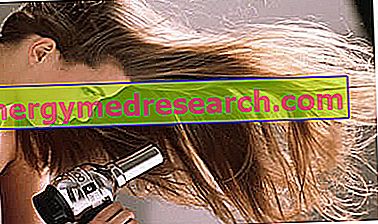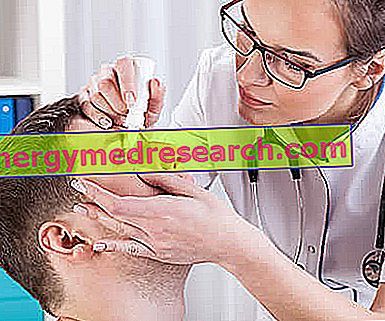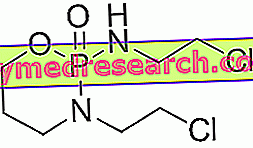Generally, dry hair is observed when the secretive activity of the sebaceous glands present in the scalp is drastically reduced; consequently, the little lubricated hair appears visibly dry, dry and opaque.

Dry hair can be favored or worsened by countless factors: atmospheric insults (salt water, wind, UV rays, etc.), irritants (colored dyes, pool chlorine), pathologies (hyper / hypothyroidism, Hashimoto's disease), poor nutrition in protein or lacking in vitamins and essential fatty acids, excessive washing, use of aggressive shampoos or unsuitable for your type of hair.
What to do
- Wash your hair with delicate and easy to rinse shampoos, without any perfumes, dyes or aggressive preservatives.
- After washing, apply a conditioner or cream to the hair formulated with moisturizing, emollient and anti-reddening active ingredients. Let us remember briefly that dry hair tends to be accompanied by a marked hypersensitivity to the scalp, sometimes responsible for local irritation, scaling and burning
- The so-called non-rinse products, to be applied after shampooing, provide deep hydration to the hair, without making it greasy
- After shampooing, we recommend applying a nourishing hair mask, leaving it on for a few minutes before removing it. Do-it-yourself hair masks (made for example with egg, yogurt and olive oil) should instead be applied before shampooing.
- Prefer cosmetic products formulated with sericin, a silk protein capable of positively interacting with the surface of the hair through bio-adhesion mechanisms. Thanks to these processes, the sericin has an extremely positive effect since it gives rise to a protective elastic film around the stem, thus increasing the thickness and hydration of the dry hair
- Brush dry hair gently, taking care not to pull it: for this purpose, we recommend using a wide-toothed comb
- If necessary, apply keratin-based lotions to strengthen the hair (effective remedy to increase the thickness throughout its length)
- Especially in summer, spray or lotions containing sunscreens and moisturizing substances should be applied to dry hair
- Spread your hair often to eliminate split ends
What NOT to do
- Use fixing products (gels, foams, lacquers): besides being irritating to the scalp, these cosmetics favor the adhesion of dust and impurities on the hair, further worsening the disorder of dry hair
- Coloring, bleaching and permanent: these professional treatments undermine the structure of the hair in general and of the dry ones in particular; therefore, they are strongly advised against (especially in the presence of unruly hair)
- Use the hair dryer very close to the hair: the too hot air of the hair dryer and the excessive closeness to the hair encourage a further dehydration of the hair
- Frequent washing: unlike greasy hair, dry hair does not like to be washed too often. Shampoos, water, conditioners and other cosmetic products, if used too frequently tend to wear out the hair, making it more prone to breakage
- Use large amounts of shampoo: in addition to infrequent washing, dry hair requires a small amount of shampoo
- Fold with electric rollers, plates and needles for curls: as these are real torture tools for dry hair, it is strongly recommended to avoid using them. To curl a hair it is a good rule to use the old remedies: the normal rollers (without the use of heat) are extremely indicated and rather delicate for dry hair
- Swimming in the pool or in salt water without a cap: it is advisable to always use the rubber cap before going to sea to avoid that the salt water (or rich in chlorine if you prefer the pool) further damages dry hair
What to eat
- Take lots of fruit and vegetables, as it is rich in antioxidants (vitamin C and E)
- Prefer foods rich in essential fatty acids (ω ‰ 3 and ω ‰‰ 6) that abound in fish (salmon, cod, sardines, mackerel) and in dried fruit (walnuts, almonds, peanuts)
- If necessary, supplement the diet with vitamin supplementation
What NOT to Eat
- There is no scientific evidence that relates food to worsening dry hair. It is recommended to follow a healthy, balanced diet, rich in fruit, vegetables and low in fat.
Natural Cures and Remedies
- Lubricating the hair with specific products, even of natural derivation, is extremely important to deeply moisturize and nourish the hair. The natural cosmetic preparations, certainly delicate for dry hair, can be formulated with active ingredients extracted from these plants:
- Altea: its richness in starch, pectins, flavonoids and mucilages gives moisturizing, emollient and anti-reddening properties to the product in which it is inserted
- Rosa centifolia: the extract of this vegetable (rich in flavonoids, anthocyanins and pectins) is a natural remedy very suitable for dry hair thanks to its moisturizing and restorative properties
- Cornflower: the polysaccharides contained in the drug, after adsorbing considerable amounts of water, hydrate the hair by progressively giving water to the stem of each individual hair
- Vegetable oils in general (eg sweet almond oil, wheat germ oil, Argan oil): they can be used to prepare a mask or a warm compress for dry hair
- Even mayonnaise can be applied to dry hair to deeply nourish them. Distribute a fair amount of product on wet, dry hair and, after 10-20 minutes, rinse with a mild shampoo
- Beer-based fixative lotion: this drink is a panacea for dry hair (to be used for topical application). Distributed on the scalp, the beer gives the hair a luminous, vital and above all healthy appearance
Pharmacological care
- Drugs are not necessary to treat dry hair: if the disorder is related to hypothyroidism, hyperthyroidism or Hashimoto's disease, it is clearly necessary to follow a specific pharmacological treatment for the underlying problem
Prevention
- Comb the dry hair gently to prevent it from breaking
- Practice infrequent washings with delicate shampoos
- Avoid keeping your hair tied with tight elastics
- Do not expose yourself to the sun before distributing a protective product on your hair
Medical treatments
- Except for the pathological cases of dry hair (depending for example on pharmacological treatments or underlying diseases), it is not necessary to intervene with specific medical treatments.
- Dry, particularly dry and rebellious hair may require more intensive treatments: hairdressers and trichologists can undoubtedly improve the condition.



